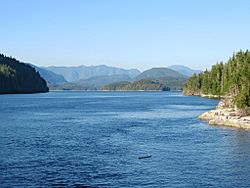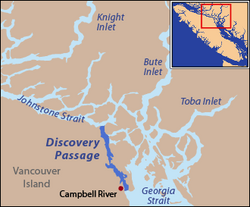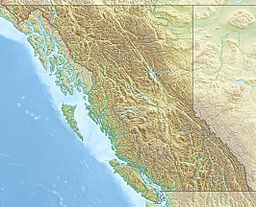Discovery Passage facts for kids
Quick facts for kids Discovery Passage |
|
|---|---|
| French: Passage Discovery | |

Looking south from between Vancouver Island and Sonora Island
|
|
 |
|
| Location | British Columbia, Canada |
| Coordinates | 50°13′N 125°23′W / 50.217°N 125.383°W |
| Type | Strait |
| Part of | Inside Passage, Discovery Islands |
| Ocean/sea sources | Salish Sea |
| Max. length | 25 km (16 mi) |
| Max. width | 2 km (1.2 mi) |
| Max. depth | 100 m (330 ft) |
| Sections/sub-basins | Seymour Narrows |
Discovery Passage (also known as French: Passage Discovery) is a narrow body of water in British Columbia, Canada. It is a strait, which means it's a natural waterway connecting two larger bodies of water. This passage is a key part of the Inside Passage, a famous route for ships along the coast. It lies between Vancouver Island and the Discovery Islands. Many ships use Discovery Passage to enter or leave the Salish Sea from the north.
Contents
How Discovery Passage Got Its Name
The name "Discovery Passage" comes from the ship of a famous explorer. In 1792, Captain George Vancouver sailed through this area. He named the passage after his ship, HMS Discovery. Some sources suggest that another captain, Henry Kellett, officially named it later. However, it was Captain Vancouver's ship that first explored this waterway.
Exploring the Geography of Discovery Passage
Discovery Passage is about 25 km (16 mi) long. Its average width is around 2 km (1.2 mi). However, it gets much narrower in one spot. At Seymour Narrows, the passage shrinks to only 750 m (820 yd) wide. This narrow section is known for its strong currents.
Islands Around the Passage
Most of the eastern side of Discovery Passage is bordered by Quadra Island. Further north, Sonora Island forms part of the shoreline. At its northern end, Discovery Passage connects with Johnstone Strait. To the south, it opens into the Strait of Georgia. The Strait of Georgia is a large arm of the Salish Sea.
Ships That Use the Passage
Discovery Passage is a very busy waterway. Many different types of ships travel through it. You might see large cruise ships carrying tourists. There are also cargo ships moving goods. Fishing boats often use the passage for their journeys. Even ferries from the Alaska Marine Highway and BC Ferries systems regularly cross these waters.
See also
 In Spanish: Pasaje Discovery para niños
In Spanish: Pasaje Discovery para niños
 | Selma Burke |
 | Pauline Powell Burns |
 | Frederick J. Brown |
 | Robert Blackburn |


